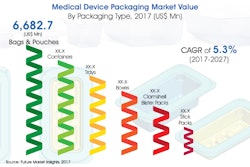Part of the FDA’s mission is to monitor the pharmaceutical supply chain to support patient access to necessary drugs.
Late last week, the Department of Health and Human Services announced plans to create a work group to examine prescription drug importation policies.
In a statement, Commissioner Scott Gottlieb noted that “for certain critical medicines, where there are no blocking patents or exclusivities associated with the drugs, but where there is only a single manufacturer (sole-source); conditions may develop that create significant barriers to, and ultimately threaten, patient access.”
Conditions for importation
Gottlieb explained, “Conditions could include dislocations in the supply chain or sudden, significant price increases that close off channels of availability. These circumstances can leave patients without access to drugs they need. These could be situations where there’s only one U.S. approved and marketed version of an old drug that’s not commonly used, but is still medically important. Many of these cases involve generic medicines. These disruptions can create public health consequences that are similar to the occurrence of a drug shortage.”
The FDA intends to examine whether the additional market competition from short-term importation drug will “complement” the agency’s efforts and help meet near-term patient need until conditions for the drug change (i.e. new domestic competition is available).
Work group
The work group will explore policies that would allow importation of medically necessary drugs that meet the specific conditions, while assuring safety and effectiveness. Gottlieb listed considerations, including:
-
How the FDA will define an access dislocation in these circumstances
-
How public health need will be determined
-
How the agency will assess the safety, effectiveness and labeling of a foreign-approved drug
-
How the FDA will continue to protect patient safety through a secure drug supply chain and pursue enforcement against unsafe and illegal drug products
-
How to ensure such a policy maintains the incentives and balanced framework that supports manufacturers seeking FDA approval for these products (the primary objective)
Gottlieb was clear in his message that any importation policy developed by the work group would be temporary “until adequate competition enters these categories.” He added, “The agency has advanced a number of new initiatives, as part of our Drug Competition Action Plan, to pursue this primary and overriding objective of stable, safe and effective competition.”
Security concerns
Healthcare Distribution Alliance (HDA) President and CEO John M. Gray released a statement following the FDA announcement, noting, “HDA and the nation’s primary pharmaceutical distributors appreciate the Trump administration’s efforts to address the high cost of healthcare in the United States. However, we have significant concerns with allowing the importation of prescription drugs intended for sale in foreign markets into this country. Importation would threaten and destabilize the significant industry-government collaboration already underway to ensure the safety and security of the domestic pharmaceutical supply chain through implementation of the Drug Supply Chain Security Act (DSCSA).
He went on to explain the that U.S. pharma supply chain is sophisticated, efficient and secure, and that implementation efforts are underway to meet DSCSA milestones, “with the goal of achieving electronic, unit-level traceability of prescription drug products by 2023.”
“HDA and our members are committed to working with the administration, Congress and our pharmaceutical industry partners to do what we can to deliver efficiencies to the supply chain to accomplish the objectives set forth in the Blueprint to Lower Drug Prices and Reduce Out-of-Pocket Costs. However, we urge HHS and FDA to honor their pledge to protect patients and the safety of the supply chain by maintaining our secure system of distribution.”





















